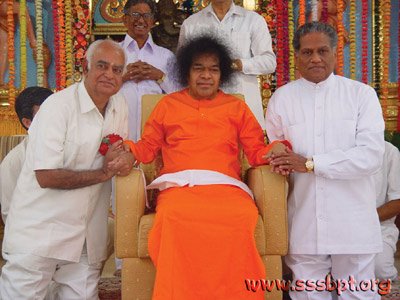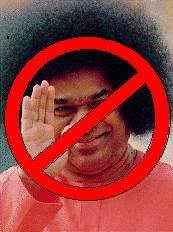An anonymous comment was left at my recent '
Guru Of The Month' blog. Here it is (in bold) along with my reply. Spelling and grammatical errors have been left untouched::
Dear One,
i am reminded of what i read in the Mahabharata, that the evil sisupala , who day and night thought evil of Sri Krishna, found liberation when Slayed by Him, just becoz he thought of Him alwys even if the thoughts were evil.i hope you find the same grace.
Thank you very much, dear one, although I'm unsure if that is a compliment or an insult. Some people might find being compared to a demonic and inimical figure to be rather flattering, but since I'm familiar with the Hindu tradition and also the mentality of Sai devotees/admirers I feel I can understand the subtleties behind this.
In any case, I'd like to take this opportunity to discuss a little philosophy if I may since I find this to be a typical sentiment levelled against the critics of Sathya Sai Baba. The idea behind the story of Shishupala is that he was inimical to Lord Krishna since birth, and his hatred came to a climax when he witnessed Krishna being fully honoured at a public celebration. After spending a considerable amount of time insulting Krishna to the shock of the assembly, he was killed and his soul emerged from his body and was seen to merge into Krishna's lotus feet.
That's the story in brief. However, few people know that, according to the legend, Shishupala was actually
a great devotee of the Lord and in his original form was one of the two gatekeepers of Vaikuntha, the Kingdom of Heaven. After mistakenly offending a group of spiritual sages, the gatekeepers Jaya and Vijaya were cursed by the sages to fall from Vaikuntha and become haters of the Lord. By the grace of Lord Vishnu, this curse was limited to three births that Jaya and Vijaya both had to undergo before they could be restored to their rightful position. These births were as Hiranyaksha and Hiranyakashipu (catalysts for the Varaha and Narasimha incarnations), Ravana and Kumbhakarna ("villains" of the Ramayana) and then lastly as Shishupala and Dantavaktra (connected with the Krishna incarnation).
The Shishupala incident is often cited as an explanation for anti-Sai behaviour (and their ultimate destination) by devotees and admirers of Sathya Sai Baba, but as can be seen above it is practically useless as an analogy considering the true state of their internal devotion. A better example to use would be Kamsa, the maternal uncle of Krishna who hated him from his birth and schemed in various ways to kill him. Hardly surprising, considering that Kamsa's presence on the planet was one of the reasons and catalysts for the Krishna incarnation. ;-)
Kamsa (pronounced 'Kuns' or 'Kunce') is a good example of a truly demonic figure whose constant thinking and meditation on Krishna consisted of pure hatred and fear. Since God is characterised as all-benevolent and all-spiritual, Kamsa did indeed attain liberation by being granted the opportunity to merge into the Lord's 'Brahman' effulgence after he was killed by Krishna, but there is a marked contrast in attitude.
Why are sadhakas (spiritual seekers) enjoined to
love God and worship Him with
devotion when the "same" result of liberation can be attained by hating Him á la Kamsa? One answer is referenced in an important verse of a chief Gaudiya Vaishnava scripture (entitled 'Bhakti-rasamrita-sindhu') that states that pure love of God is attained by the
favourable cultivation of devotion. In other words Kamsa's constant contemplation of God was characterised by fear and hatred and is thus considered
unfavourable.
Whereas Kamsa's constant contemplation is nevertheless admirable in a way and since God is believed to be all-spiritual and so on, Kamsa was granted the boon of merging into the Lord's effulgence. While it may come as a shock and a surprise to you, some traditions consider this to be a
lesser goal compared to what else is available. As indicated by the scriptural reference,
favourable devotion brings much higher things.
Why have I spent so much time talking philosophy? Perhaps Sai devotees/admirers need to be taught a few things about the theology that they subscribe to, as simply paying lip-service to namesake 'demonic' figures without a more complete version of the situation and to mask a shocking ignorance of the vast Sanathana cornucopia leads to these sorts of embarrassing bumblings and boo-boos. So although I do appreciate the sentiment, I'm not so keen on reaching the same destination as Shishupala and Kamsa. Beyond that, I'm very sorry to state that I do not subscribe to the idea that Sai Baba is God or some sort of divine figure who has the power to afford liberation to those who think of him, even in an "evil" way. It is beyond me to understand how anything other than
homosexual paedophilia,
murders, financial scandals and so on can be regarded as anything other than evil.
You may have been a devottee for a decade, but you surely didnt learn much.
That's your opinion, of course. I wouldn't regard myself as a person who enjoys blowing his own trumpet, but I do believe that I learnt a lot during my time with Sathya Sai Baba. Although my interest was much more focused on the stories of his miracles rather than on his teachings, I couldn't help but notice the
glaring discrepancies that
existed in his works.
But apart from inadvertently displaying a knowledge of the Vedic philosophy that Sai Baba
pretends to subscribe to, it really comes to something when your fellow Bal Vikas (Sunday School) students are so thick that they didn't even know the civil name of Sai Baba, 'Sathyanarayana Raju'?
i dont care if Baba is God, i dont care about His miracles, But one thing i know for sure, that He is the ocean of purity. i am not just a devotee but some one who has had a chance to witness things first hand.
It would be interesting if you could outline just a few of these things that you claim to have witnessed first-hand. If you're not talking about miracles, then I wonder what are you talking about?
Perhaps you speak this way in order to give an impression that
your experience of Sai Baba is somehow more complete and far-reaching than that of others. Whereas I was a devotee for just over 10 years and had two interviews a number of us have had differing levels of close contact with Sai Baba, enough to speak authoritatively on certain matters.
Robert Priddy, for instance, is an ex-Office Bearer of the Sai Organisation and played a major part in the formation of the Organisation in Norway. He also got to sit on the verandah. Another,
Conny Larsson, was a close devotee who I personally met in the summer of 1994. Larsson was molested by Sai Baba.
All in all I reckon that just two ex-devotees who were close to Sai Baba constitute sufficient authority to speak on certain aspects of Sai Baba's personality and behaviour. Other than that, you might like to read a story about a
copper bangle.
The evil that you see in Him is a reflection of whats within you.
Tsk, now you
know that was a naughty thing to say, don't you?
We have a saying that when a thief sees a running man he thinks that the man must be a thief who is running from the cops, whereas if a devotee sees the running man he thinks that he is running towards the temple to worship his Lord.
May the Lord forgive you for you know not what you do!
Er, thanks, I think. We also have a saying that is wholly applicable to the Sai Baba situation if I do say so myself:
Copyright © Sai Baba EXPOSED! 2005-2007.















